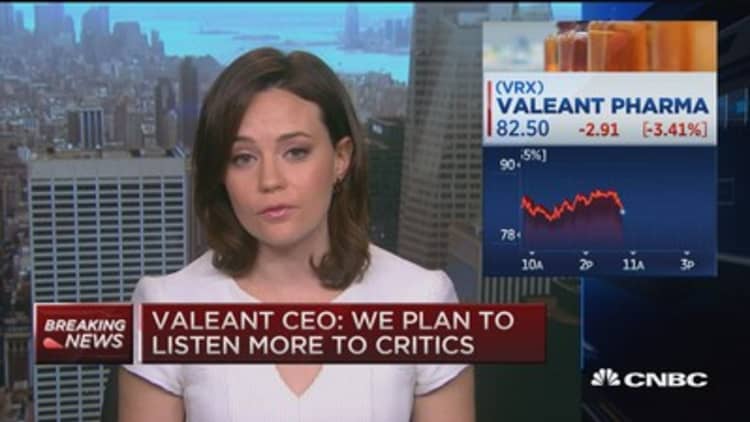That's one valuable "boo-boo" this drug company boss might have gotten.
A new report suggests embattled Valeant Pharmaceuticals CEO J. Michael Pearson might have netted a windfall — on paper at least — of more than $27 million after his company delivered to him "in error" the right to receive more than 500,000 shares of stock in 2013.

The article raises questions about how this bizarre error occurred.
Valeant also has yet to explain its rationale for allowing Pearson to compensate Valeant by "returning the value" of what the shares were worth at the time he received them, as opposed to paying what they were worth when the error was apparently rectified by another transaction executed by the company nearly a year later.
The report about the error was published Wednesday by the Southern Investigative Reporting Foundation (SIRF), which has written several previous articles raising questions about Valeant's relationship with a specialty pharmacy named Philidor Rx.
That pharmacy is now closing because Valeant severed ties to it last month on the heels of criticisms of Philidor's practices, which led major pharmacy benefit managers to say they would no longer do business with Philidor.
Valeant's stock price has been pummeled in the past month amid a series of reports questioning how it prices its drugs and how it booked revenue. Pearson has denied Valeant engaged in any wrongdoing.
SIRF's latest report noted that Pearson filed a so-called Form 4 with the Securities and Exchange Commission on March 13, 2014.
The one-page form details how two days earlier Pearson received 502,996 restricted share units, which each represented the right to receive one share of Valeant stock. The form was signed for Pearson by Nicholas Zanoni, who is the senior manager for executive compensation at Valeant.
The second footnote on the form says that Valeant had delivered 502,996 "vested performance share units" to Pearson "in error" almost a year beforehand, on May 24, 2013. Another footnote says that those performance-based RSUs vested on that day in May 2013, but are "generally not issuable until 2019 pursuant to Mr. Pearson's employment agreement."
The Form 4 doesn't say how that "error" occurred.
However, the second footnote on Form 4 says that at some point after getting the performance share units in 2013, Pearson returned to Valeant "the value of such shares on the date of delivery (plus interest)."
In connection with Pearson returning that value, Valeant then credited him with the 502,996 "vested share units" that are the subject of the Form 4 filing, according to the footnote.
SIRF's report notes that Valeant's stock was trading at $84.47 per share on May 24, 2013, the day that the company erroneously awarded Pearson the restricted share units. On March 11, 2014, the day that Pearson received the same number of restricted shares to compensate him for having returned to Valeant the value of the erroneous RSU award, Valeant was trading at $139.96 per share.
SIRF's article points out that if one assumes that Pearson wrote Valeant a check to compensate the company for the initial share award, it would have been for $42.48 million. That is almost $28 million less than the $70.39 million the same number of shares were worth in March 2014, when he received the second award.
However, Valeant's stock is worth a lot less than that now. The shares were trading in the mid-$70s on Thursday.
When CNBC reached out for comment, Laurie Little, senior vice president for investor relations at Valeant, said, "The fact is that the misdelivery of shares to Valeant's CEO was publicly disclosed in an SEC filing on March 13, 2014."
"As disclosed in our public filing, the shares that Mike Pearson received in error were fully vested as of May 24, 2013, based on achievement of the applicable performance criteria, and Mr. Pearson repaid the value of the shares he received plus interest."
A Valeant spokeswoman confirmed it was a "clerical error." She added the error occurred because Valeant was following procedures used for other company employees in which performance share units vest and settle concurrently. "Mr. Pearson's then-current compensation agreement had a provision requiring delayed settlement of vested shares until 2019. He was the only Valeant employee with that provision, and the shares were mistakenly delivered under the procedures used for other employees. The error was discovered in the fourth quarter of 2013 and corrected in that same quarter by Mr. Pearson returning to Valeant the taxable income incorrectly paid to him."
The spokeswoman added: "The taxable amount was determined in accordance with Valeant's standard practice of valuing stock at the closing price the day prior to vesting. In accordance with the corrections procedures outlined by the Internal Revenue Code, Mr. Pearson paid this amount to the company, plus interest. Pursuant to the corrections procedure, Mr. Pearson could have repaid the taxable income either in cash or by returning a number of shares equal to the value delivered in error. Mr. Pearson elected to repay cash."
Goldman sold 1.3 million Valeant shares on Nov. 5 after telling Pearson it needed to do so if he didn't repay the balance of that loan. The sale by Goldman contributed to a 14 percent drop in the stock that day.
UDPATED: This story was updated to include a full statement from a Valeant spokeswoman.



